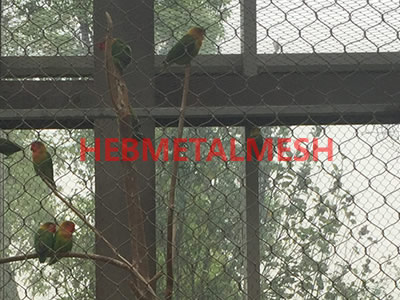Birds, like any other pets, deserve to have a secure and comfortable living space. Be it a small cage in your home or a big aviary for outdoor birds, keeping the birds safe from potential harm is the utmost priority. Bird cage netting is one of the most common and practical ways to provide birds with a safe and secure living space. In this article, we will discuss everything you need to know about bird cage netting.
What is Bird Cage Netting?
Bird cage netting is a mesh wire that is installed around a birdcage or aviary to prevent birds from escaping or predators from entering. It is a flexible and lightweight material that can be easily cut to fit any size and shape of birdcage. The netting comes in various sizes and thicknesses, depending on the intended use and requirements.
Types of Bird Cage Netting
There are two primary types of bird cage netting: plastic and metal. Both types are durable and can withstand the harsh outdoor weather conditions.
Stainless Steel Rope Mesh

Stainless steel rope mesh is a great material for bird cage netting because it is durable, strong, and resistant to corrosion, making it ideal for outdoor as well as indoor use. The open design of the mesh provides plenty of visibility and allows birds to perch comfortably, while also keeping them safely enclosed. The rope construction of the mesh also allows for easy installation and customization to fit any size or shape of bird cage. Additionally, stainless steel rope mesh is easy to clean and maintain, ensuring a safe and healthy environment for your feathered friends.
Plastic Netting
Plastic bird cage netting is made of high-density polyethylene (HDPE), which is a lightweight, durable, and non-toxic material. It is commonly used for small bird cages, chicken coops, and garden enclosures due to its flexibility and easy installation. The netting is available in various mesh sizes and colors, giving bird owners a wide range of options to choose from.
Plastic netting is also easy to clean and maintain. The plastic material is resistant to bacteria, mold, and mildew, making it ideal for outdoor use. However, plastic bird cage netting is not suitable for large birds or birds with strong beaks as they can easily chew through the netting.
Metal Netting
Metal bird cage netting is made from high-grade stainless steel or aluminum wire mesh. It is a more robust and durable option than plastic netting, making it ideal for large bird enclosures or outdoor aviaries. The metal netting provides excellent protection against predators such as cats, raccoons, and snakes, which are unable to break through the metal mesh.
Metal netting is available in various mesh sizes, thicknesses, and finishes, giving bird owners the freedom to choose the best option for their particular birdcage or aviary. However, metal bird cage netting is more expensive than plastic netting and can be challenging to install. The metal material is also prone to rusting, which can reduce its lifespan.
Benefits of Using Bird Cage Netting
There are several benefits of using bird cage netting in your birdcage or aviary, including:
Prevents Birds from Escaping
The primary purpose of bird cage netting is to prevent birds from escaping their enclosure. Birds are curious and intelligent creatures and can easily find ways to slip out of their cages. By installing bird cage netting, you can provide them with a safe and secure environment.
Protects Birds from Predators
Birds are vulnerable to predators such as cats, snakes, and larger birds of prey. Bird cage netting provides a physical barrier between the birds and predators, preventing them from entering and harming your feathered friends.
Allows for Natural Light and Ventilation
Bird cage netting allows natural light and fresh air to circulate through the enclosure, creating a healthy living environment for the birds. The mesh material also prevents stagnant air from building up inside the enclosure, reducing the risk of respiratory problems.
Provides a Sense of Security
By having a secure enclosure, birds feel safer and more comfortable, reducing their stress levels and improving their overall well-being. The netting also provides a boundary for the birds, preventing them from feeling overwhelmed or threatened by their surroundings.
Factors to Consider When Choosing Bird Cage Netting
When choosing bird cage netting, several factors should be considered, including:
Mesh Size
The mesh size of the netting should be appropriate for the size of your bird’s beak. If the mesh size is too large, birds can stick their heads through the holes, creating a choking hazard. If the mesh size is too small, birds can get their beaks caught in the tiny holes, causing injuries or trapping them.
Material
The material of the netting should be durable and non-toxic. Avoid using netting made from materials that can rust, as the rust can be harmful to the birds. Also, ensure that the material is not toxic if ingested by the birds.
Installation
The installation process should be easy and straightforward. Choose netting that can be easily installed around the cage or aviary without the need for professional assistance.
Cost
The cost of the netting should be within your budget. Plastic netting is generally cheaper than metal netting, but it may not be suitable for large birds or outdoor use.
Conclusion
Bird cage netting is a practical and essential accessory that every bird owner should consider when creating a safe and secure.

